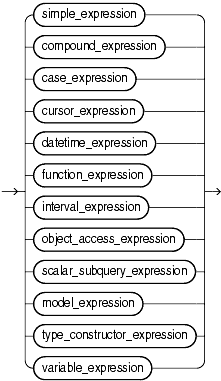| Oracle® Database SQL Reference 10g Release 1 (10.1) Part Number B10759-01 |
|
|
View PDF |
| Oracle® Database SQL Reference 10g Release 1 (10.1) Part Number B10759-01 |
|
|
View PDF |
An expression is a combination of one or more values, operators, and SQL functions that evaluates to a value. An expression generally assumes the datatype of its components.
This simple expression evaluates to 4 and has datatype NUMBER (the same datatype as its components):
2*2
The following expression is an example of a more complex expression that uses both functions and operators. The expression adds seven days to the current date, removes the time component from the sum, and converts the result to CHAR datatype:
TO_CHAR(TRUNC(SYSDATE+7))
You can use expressions in:
The select list of the SELECT statement
A condition of the WHERE clause and HAVING clause
The CONNECT BY, START WITH, and ORDER BY clauses
The VALUES clause of the INSERT statement
The SET clause of the UPDATE statement
For example, you could use an expression in place of the quoted string 'Smith' in this UPDATE statement SET clause:
SET last_name = 'Smith';
This SET clause has the expression INITCAP(last_name) instead of the quoted string 'Smith':
SET last_name = INITCAP(last_name);
Expressions have several forms, as shown in the following syntax:

Oracle Database does not accept all forms of expressions in all parts of all SQL statements. Please refer to the individual SQL statements in Chapter 10 through Chapter 19 for information on restrictions on the expressions in that statement.
You must use appropriate expression notation whenever expr appears in conditions, SQL functions, or SQL statements in other parts of this reference. The sections that follow describe and provide examples of the various forms of expressions.